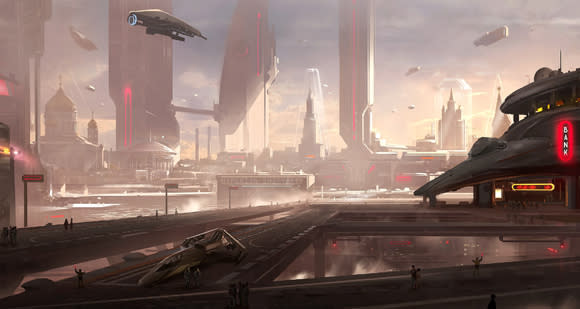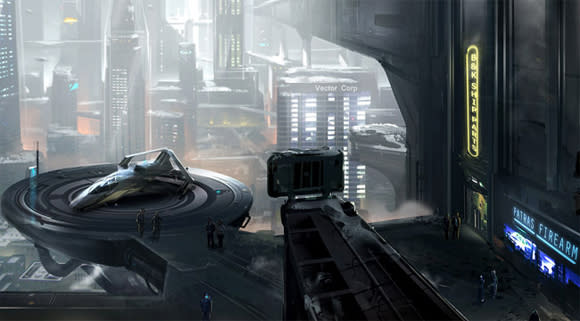Stick and Rudder: On crowdfunding and 'dev abuse'
The DFM PAX reveal came and went, and it was exactly what I expected: full of bugs befitting an alpha state and still absolutely stunning in terms of its potential.
And that's all that really needs to be said about that, at least until we get our hands on it in the comfort of our own homes! I'm more interested in riffing off some of the trollish behavior from the pre-PAX backer-only gala. If you watched the full presentation, you probably know what I'm talking about. If you didn't, well, it was basically drunks being drunk, but it leads into something I've wanted to talk about for a while, which is mass appeal, niches, and the gaming industry viewed through the prism of Star Citizen.

First things first, I need to credit this recent thread on the official Star Citizen forums for reminding me about an old article that attempted to paint game devs as under siege by unhinged internet jerks.
Usually my heart bleeds as much as the next man's, but there's so much wrong with the piece's sentiments -- and by proxy the concern that some in the Star Citizen community are making Cloud Imperium devs miserable -- that it's hard to know where to start. I think I'll lead off with the disconnect that the author and many game developers seem to have with certain genre fans.
See, gaming fans, particularly those who have been gaming for a while (let's call them hardcore, for lack of a better term), know what they like. They've played a lot of games, they generally play games for long periods of time and as their primary means of recreation, and they don't take kindly to things they love being co-opted to service less invested fans.
This is of course directly at odds with the big business that gaming has become, where for-profit entities are falling all over one another to find new ways to monetize existing customers while simultaneously making a "gamer" out of every muggle with an internet connection.

This hardcore-vs.-mass-market angst doesn't just apply to video games, either. Years ago, war gamers, board gamers, and tabletop types were hopping on the nearest BBS to complain about those damn computer kids dumbing down their favorite hobby. And before that, some Paleolithic chap scratched the very first funk-you-I-quit forum post on the stone of his bedroom wall to protest a particularly galling rule change in his favorite caveman-vs.-caveman title.
The point is, disgruntled hardcore types and their mislabeled "dev abuse" aren't a new phenomenon and they also aren't going anywhere. And they shouldn't, unless we're no longer interested in living in a free society or rewarding excellence in game development as opposed to existence in game development. Aside from the obvious need for anyone in a public-facing profession to develop thick skin, the feeling I'm left with after reading the Polygon piece is, "What did you expect?"

When a triple-A dev like former BioWare writer Jennifer Hepler says that "games cost much too much money to focus on a niche market" and that "to survive, they need to be such a broadly popular part of entertainment culture that you would be hard-pressed to find anyone who doesn't play games," she is inviting internet vitriol from the very people who made her industry successful and provided her with a job.
It's kind of a "duh" moment. I mean, really, should fans who are being marginalized by the industry's mass-market leanings simply smile and take the erosion of their pastime lying down?
More importantly, Hepler's statement is patently false -- or at least myopic -- as Star Citizen is showing us. Maybe BioWare's games "cost much too much money to focus on a niche market," and maybe that's because BioWare is doing it wrong and is a prime example of the sort of over-staffed and over-produced game development that needs to go away.
Why was BioWare, for example, unable to deliver an MMO with half of Star Citizen's feature set on nearly four times its budget? Now, you're right in thinking that Star Wars: The Old Republic and SC are vastly different MMOs. And that's my point. Star Citizen is going to have a fully voiced, story-driven campaign (Squadron 42), but it's also going to have sprawling, free-form sandbox play and all of the associated virtual world sticky stuff that SWTOR lacks. And oh yeah, actual space combat, too!
Maybe it's not so impossible to make a triple-A game with a relatively small budget? We'll find out when SC releases.

Anyway, I get the anti-dev abuse movement. Devs are real people with real feelings, and they just want to make money so that they can drive BMWs and put their kids in private schools. So do you. So do I. That's fine. Except that not everyone gets to do that. Games are a luxury item. There is only so much time in the average consumer's life for gaming, and currently there are just too damn many games. Some of them, most of them, are going to be crap, and accordingly they are going to sell like crap.
Gaming in general and MMO gaming in particular is more bloated now than it has ever been. While some may see this as a watershed era filled with "choice" -- even though said choice is usually 37 flavors of themepark vanilla -- the reality is that few of these games are going to generate a buck over the long-term. That's why free-to-play is a thing. Companies are so desperate to keep up with their own mismanaged budgets that they're willfully engaging in a race to the bottom and allowing monetization to dictate game design.
That brings me back to Star Citizen and its over-the-top fanbase. As distasteful as their behavior may occasionally be, Star Citizen and its 200-odd developer jobs literally wouldn't exist without these people. Chris Roberts tried to secure traditional funding for the game prior to Kickstarter and was dissatisfied with the results, which ultimately left the fate of the space sim sandbox in the hands and wallets of hardcore gamers who subsequently made it the most successful crowdfunding project in history. These are the kinds of gamers who get crazily invested, who get drunk at cons and confrontational on the internet, and who are constantly dismissed by devs, executives, and fashionable blogerati.
If name-brand studios truly can't make big games on reasonable budgets anymore, then Star Citizen, crowdfunding, and these sorts of supporters are the future of triple-A games. Or maybe there's some sort of modern day video game crash on the horizon as the industry swells with would-be devs. I can't predict the future with any certainty, but one thing I do know is that making triple-A games is a privilege. Not everyone gets to do it, and if a title such as Star Citizen comes along and manages to be triple-A on a fraction of a triple-A budget, well, that just calls into question the competence of everyone else.


Whether it's interviews with Chris Roberts and the Cloud Imperium team or tips and guides for pushing your ship's performance envelope, Stick and Rudder is your inside source for news and commentary on the world of Star Citizen. Join Jef Reahard every other Sunday during the run-up to alpha, beta, and beyond.



